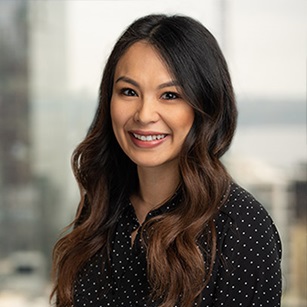By Nancy Saelee, Seattle Foundation Executive Assistant to CEO

I am Mien, also known as the Yao people from South East Asia, a minority group that originated from China. My parents were born and raised in Laos and considered to be Hill Tribe people. Mien people do not have a country of their own so many live in Laos and Thailand. My last name is actually “Lee” and not “Saelee.” The “Sae” was given to the Mien people by the Thai government to identify us.
As I sit and watch my daughter interact with my mother, it reminds me of growing up with my grandma (my daughter’s great grandmother) and the special times we shared during my childhood.
When my family migrated from Laos to the U.S. in 1978, my parents and grandparents did not speak English. I, along with my two brothers and one sister, grew up with my grandmother who only spoke Mien. As a kid there was so much pressure to fit in and a desire to be like everyone else while trying to learn English as a second language. While I didn’t value speaking Mien at home as much growing up, it was how I was able to communicate with my grandma. I was able to hold onto our language and the culture because of it. As I observe the interaction of my daughter and mother, I wish I would have learned and spoke more Mien.
A year ago, when I became a first-time mother to my daughter, Natalee Mae, my whole perspective about life immediately changed. It became even more evident that I needed to make sure my daughter knew where she came from and teach her the Mien cultural roots that I was taught in my childhood. During my pregnancy, I thought of ways to incorporate my Mien culture in my daughter’s name. It’s common practice to name daughters and sons in order of birth. “Mae” (pronounced “May”) means “first daughter”, so Mae is my daughter’s middle name. Usually the second part of the father’s name is added to the first syllable, but I kept it modern and simple.
Another tradition I’ve passed on to my daughter is a Mien embroidery cap. It was made by my grandma for me to wear as an infant, which has pom-pons and handmade silver adornments that she delicately sewed onto the cap. My mom saved it and I’ve passed it on to Natalee, hoping she will do the same for her first child someday.
As I get older, the more I realize the importance of knowing my cultural roots and how it is the foundation to my own uniqueness. The one thing I wish school taught was how one should never forget where they came from and continue to practice their cultural language and beliefs, rather than only teaching students English. I can see our culture disappearing as our elders become older and the next generation adapts more of the American lifestyle.
As a mother, I feel a deepened sense of responsibility to teach my daughter that it is okay to look different, have black hair, olive skin and speak another language – which is an important skill to have. I want her to know how special it is to have her own ethnicity and culture. I want her to understand and know that it is important to know where she came from because it is who she is. I am so much more aware and appreciative of how my grandma raised me and did her best to teach me the ways of Mien culture. And now, my daughter has my mother to help me educate her. I am so thankful I have my mother to help keep our culture alive through her granddaughter.
